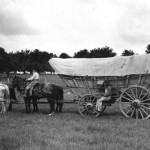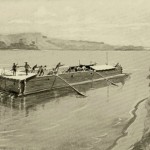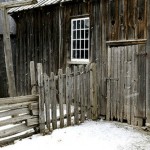“Americans have far too little sense for anything but money making and the most essential—one might say the most primitive—of needs.”
Such was the jaundiced assessment of a German resident of Allen County in the early 1850s.
Although the author of a series of letters published in the anthology Atlantische Studien, von Deutschen in Amerika [Transatlantic Studies by Germans in America] is not identified, he may have been an unwilling émigré who fled Germany after the failure of the Revolution of 1848, or a propagandist attempting to discourage Germans from leaving the homeland.
The observations of the displaced intellectual provide a unique portrait of the young Hoosier State and its residents, albeit one that must be considered in the context of the author’s cultivated European background.
Although is not clear why the self-described “dynamic thinker” finds himself in rural Indiana in 1853, he admits that he “prefer[s] life in the wild,” finding it “rewarding…to adapt to savage surroundings while studying, in the perspective of a wilderness, the problem of developing a useful, worthwhile life under these primitive conditions.”
Reporting that the state was “heavily forested” and “thinly populated”, the soil fertile and farming productive—although undertaken on a “very primitive level”–the author states that “this region possesses no great natural beauty.”
He concedes admiration for the state’s revised constitution (the Constitution of 1851), especially in its provision for alien suffrage (a measure that promoted immigration to the state), but laments the document’s prohibition of black settlement in the state.
The essayist reserves the bulk of his contempt for his neighbors’ habits and personal values. “Western Americans are best described,” he summarizes, “not so much simple as uncouth. There is no variation in their lifestyle and enjoyment,” he complains. “Fried salt pork, corn, pancakes prepared with baking soda (hence Yankees’ melodious belching after a hearty meal), together with…weak coffee…that is what American eat day in and day out.”
“Yankee women,” the author contends, “oppose work…a woman often rocks mindlessly in a rocking chair all day long…such is the epitome of pleasure for the Yankee woman of the West. Only in this way she realizes her full dignity and follows her highest calling: idleness and childbearing.”
Ultimately, however, the author admits that the “people in these forests are nonetheless tolerant….The backwoodsman loves freedom and equality above all else, and he will see them observed for friends and neighbors. This axiom passes from father to son and is inviolable around here.”
A Moment of Indiana History is a production of WFIU Public Radio in partnership with the Indiana Public Broadcasting Stations. Research support comes from Indiana Magazine of History, published by the Indiana University Department of History.
IMH Source Article: “‘Life in the Wild’: Three German Letters from Indiana, 1852-1853,” ed. by Frederic Trautmann, 80 (June 1984), pp. 146-65.






















